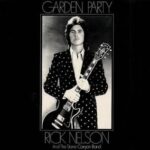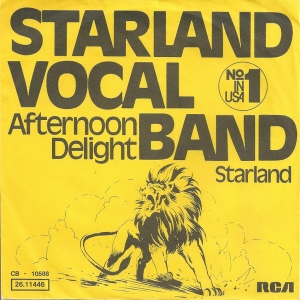 In 1972, Ricky Nelson, already a household name from his teenage rock ’n’ roll stardom and iconic television presence, released “Garden Party,” a song that would become one of the most defining moments of his career. It was a track born from personal reflection, artistic integrity, and the challenges of growing up in the public eye. Unlike the upbeat teen idol hits that had made him famous in the late 1950s and early 1960s, “Garden Party” carries a reflective and slightly sardonic tone, addressing the tension between commercial expectations and artistic authenticity. With its catchy melody, storytelling lyrics, and candid commentary on the music industry, the song resonated with both longtime fans and new listeners, illustrating the universal struggle of staying true to oneself amidst public scrutiny.
In 1972, Ricky Nelson, already a household name from his teenage rock ’n’ roll stardom and iconic television presence, released “Garden Party,” a song that would become one of the most defining moments of his career. It was a track born from personal reflection, artistic integrity, and the challenges of growing up in the public eye. Unlike the upbeat teen idol hits that had made him famous in the late 1950s and early 1960s, “Garden Party” carries a reflective and slightly sardonic tone, addressing the tension between commercial expectations and artistic authenticity. With its catchy melody, storytelling lyrics, and candid commentary on the music industry, the song resonated with both longtime fans and new listeners, illustrating the universal struggle of staying true to oneself amidst public scrutiny.
“Garden Party” was inspired by a very specific event: Ricky Nelson’s performance at a concert at Madison Square Garden, where he faced an audience that booed him for attempting to perform new material rather than sticking to his old hits. This moment became a turning point for Nelson, motivating him to confront the pressures of fame and the expectations placed on him by fans and industry insiders alike. The song’s lyrics cleverly recount the experience with humor and honesty, encapsulating a broader message about artistic freedom and the courage to evolve as a musician. The chorus—“You can’t please everyone, so you’ve got to please yourself”—remains a timeless mantra for anyone navigating the demands of public life or the constraints of conformity.
Ricky Nelson: From Teen Idol to Mature Artist
Ricky Nelson’s early career was defined by his charm, good looks, and a string of hit singles that captivated teenagers across America. Songs like “Hello Mary Lou” and “Travelin’ Man” cemented his status as a rock ’n’ roll sensation. However, by the early 1970s, Nelson sought to grow beyond his teen idol image and explore more mature musical territory. He began experimenting with country-rock influences, heartfelt storytelling, and contemporary songwriting, all of which are evident in “Garden Party.”
The song reflects Nelson’s journey from adolescent star to adult artist, negotiating the balance between commercial success and personal expression. In a sense, “Garden Party” is both autobiographical and universally relatable, illustrating the tension every artist faces when stepping outside of audience expectations. It is this honesty and relatability that gives the song its enduring power.
Lyrics and Themes
At its core, “Garden Party” is a meditation on authenticity, self-respect, and the challenges of pleasing others. The song opens with a direct reference to the Madison Square Garden performance: “I went to a garden party to reminisce with my old friends.” Nelson paints a vivid picture of the event, describing the familiar faces, the awkwardness, and ultimately, the audience’s rejection of his new material. Rather than becoming bitter or defensive, he uses humor and observation to critique both the music industry and the expectations of fans.
The chorus—“You can’t please everyone, so you’ve got to please yourself”—serves as the song’s thesis, a simple yet profound declaration of artistic independence. Beyond the autobiographical context, these lyrics resonate universally, offering wisdom for anyone struggling with the pressures of conformity, whether in art, work, or personal life. Through “Garden Party,” Nelson communicates a timeless lesson about self-expression and courage: staying true to oneself is more rewarding than seeking universal approval.
Musical Composition and Style
Musically, “Garden Party” reflects Nelson’s evolution as an artist. The song blends elements of country, rock, and pop, creating a sound that is accessible yet sophisticated. Its acoustic guitar-driven arrangement, complemented by subtle piano and bass lines, provides a warm, inviting foundation for Nelson’s vocals. The tempo is steady and upbeat, underscoring the song’s narrative quality while maintaining a sense of lightheartedness that mirrors its humorous lyrics.
Nelson’s vocal performance is intimate and conversational, capturing both the storytelling nature of the song and the emotional resonance of the Madison Square Garden experience. His phrasing emphasizes key moments, from the pointed observations of audience reactions to the reflective chorus, ensuring that listeners are drawn into the story. This combination of lyrical wit, musical warmth, and expressive vocals makes “Garden Party” a standout in Nelson’s catalog.
Reception and Impact
Upon its release, “Garden Party” achieved significant commercial success, reaching the top 10 on Billboard’s Hot 100 chart. Its reception reflected both Nelson’s enduring popularity and the public’s appreciation for the song’s honesty and humor. Critics praised its clever lyricism, melodic charm, and the way it offered a glimpse behind the scenes of life as a rock ’n’ roll star. Unlike many songs that are heavily produced to appeal to a broad audience, “Garden Party” felt genuine, capturing Nelson’s personal voice and perspective with clarity and warmth.
The song’s impact extended beyond its chart performance. It became a defining moment in Nelson’s career, allowing him to shed the constraints of his teen idol image and embrace a more mature artistic identity. By sharing his personal experience of rejection and artistic frustration, Nelson connected with listeners on a deeper level, emphasizing the importance of personal authenticity over public approval.
Cultural Significance
“Garden Party” resonates not only as a musical achievement but also as a cultural statement. In an era when artists were often pressured to conform to industry expectations, Nelson’s candid reflection on the Madison Square Garden incident challenged conventional notions of success. The song’s message about self-expression and the courage to follow one’s artistic instincts influenced musicians and listeners alike, highlighting the universal struggle of maintaining integrity while navigating public scrutiny.
The song also contributed to the rise of country-rock as a commercially viable genre, blending rock rhythms with storytelling and folk influences. Nelson’s approach demonstrated that rock artists could mature without losing their appeal, paving the way for other musicians to explore personal and reflective songwriting.
Legacy and Enduring Appeal
Decades after its release, “Garden Party” remains one of Ricky Nelson’s most beloved and enduring songs. Its narrative structure, melodic charm, and thematic resonance have allowed it to transcend generational boundaries. Fans appreciate its honesty, humor, and musical craftsmanship, while musicians recognize its importance as a model for balancing personal expression with commercial appeal.
The song’s central lesson—“You can’t please everyone, so you’ve got to please yourself”—continues to resonate, offering guidance not only to artists but to anyone navigating the complexities of life, work, or social expectation. It stands as a testament to the enduring power of music to communicate personal truth while entertaining and connecting with audiences.
Even 40 years after it’s initial release, bands such as Phish still cover the song to this day. In a show in 2012 Phish covered the song for it’s 40th anniversary
Live Performances and Fan Interaction
“Garden Party” became a highlight of Ricky Nelson’s live performances, allowing him to share the story behind the song directly with audiences. Its conversational tone and humor made it particularly engaging in a live setting, where Nelson could interact with fans, emphasize lyrical nuances, and bring the Madison Square Garden experience to life. The song’s accessibility and relatability ensured enthusiastic audience participation, with fans singing along to the memorable chorus and appreciating Nelson’s candid storytelling.
These performances reinforced the song’s enduring appeal, transforming it from a hit single into a communal experience that bridged the gap between performer and audience. By sharing a personal story with universal relevance, Nelson created a space where listeners could connect with both the music and the artist on a meaningful level.
Conclusion: The Timeless Wisdom of “Garden Party”
Released in 1972, Ricky Nelson’s “Garden Party” remains a classic example of storytelling, melodic craftsmanship, and artistic courage. Its blend of humor, reflection, and musical sophistication captures the essence of Nelson’s evolution from teen idol to mature artist, offering insights into the challenges of public scrutiny and the importance of authenticity. The song’s memorable chorus, inviting melody, and candid lyrics ensure that it continues to resonate with listeners decades after its release.
“Garden Party” is more than a song about a specific concert—it is a universal reflection on the need for personal integrity, artistic freedom, and the courage to follow one’s own path. Ricky Nelson’s ability to transform a personal moment of rejection into an enduring anthem of self-expression exemplifies the power of music to entertain, inspire, and connect. Its legacy endures as a timeless reminder that while we may not always meet the expectations of others, the most important approval is our own.


